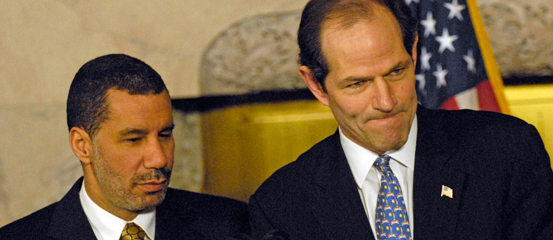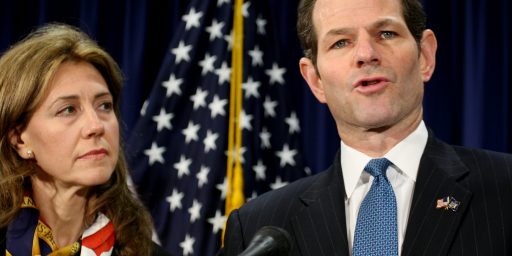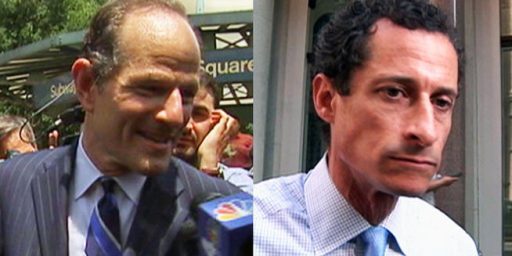Spitzer Call Girl Claims MySpace Photos Published in Violation of Copyright
Ashley Alexandra Dupre, made suddenly famous as the call girl most prominently linked to the Eliot Spitzer scandal, is angry that her name and likeness have been thrust into the spotlight.
The lawyer for the call girl linked to the downfall of Gov. Eliot Spitzer lashed out at the media on Friday for thrusting the 22-year-old woman into the “public glare” without her consent and publishing revealing photos. Since her identity was disclosed, newspapers and Web sites have splashed photos of Ashley Alexandra Dupre in suggestive poses on front and inside pages. Dupre was known as “Kristen” in court documents accusing Spitzer of paying thousands for prostitutes’ services.
Her attorney, Don D. Buchwald, said she did not consent to the use of her photos in this manner, and the usage may be a violation of federal copyright laws. He said the photos have appeared on commercial Web sites without her consent. Buchwald stopped short of saying Dupre would sue media outlets, but he contended that she is not a public figure and said he would take “all steps that we deem necessary or appropriate to protect Ms. Dupre from any unwarranted exploitation of her name, picture, voice or likeness for purposes of profit.”
[…]
Buchwald said the montage of Dupre’s suggestive photos has nothing to do with the Spitzer story. “While the circumstances surrounding Governor Spitzer’s resignation are newsworthy, some publications, in violation of journalistic norms, have used the occasion of Gov. Spitzer’s political misfortunes as an excuse to exploit Ms. Dupre’s persona for commercial purposes,” he said.
Photo District News explores the legal issues:
Three attorneys who specialize in copyright law say media organizations are sailing in dangerous waters if they publish a personal snapshot without permission. “Whoever took that picture owns that picture,” says New York attorney Nancy Wolff. “It’s either an infringement or they [the news outlets] have to make a fair use argument.”
Wolff says the news organizations probably decided the risk of a lawsuit was low. They also probably considered competitive pressure as other sources published the same photos. “It’s a fast business decision,” Wolff says.
The fair use argument would be a thin one, attorneys say. Fair use cases consider factors such as whether the image has been transformed and whether publishing the image displaces the market for the image, according to New York attorney Joel Hecker. In this case, Hecker says, the image was not transformed and it diminishes the market for the image rights. “If these are the only images available, they might go for thousands and thousands of dollars on licensing,” Hecker says. “I think the probability would be that this would not fall under fair use.” Hecker says he would advise a photographer in this situation to contact news agencies and negotiate a fee, and if that fails, to sue.
[…]
Associated Press director of photography Santiago Lyon says AP consulted with its legal department before deciding to use the photos. “Given the news value of the photographs, we decided that these were images that the public needed to see,” Lyon says.
MySpace’s Terms & Conditions page states that “MySpace does not claim any ownership rights” over the photos users post on the site. It says MySpace has the right to display user content within MySpace, but “This limited license does not grant MySpace the right to sell or otherwise distribute your Content outside of the MySpace Services.” The photos remained on Youmans’s MySpace profile Thursday morning, but had been taken down by Thursday afternoon.
My limited understanding of copyright law as it pertains to digital images leads me to believe that Dupree has a valid claim. The publishing of images on a public website does not put them into the public domain.
That strikes me as incredibly silly, though, and as a relic of the pre-Internet world. Like it or not, Dupree is a public figure now and the images are indeed newsworthy. People are naturally curious about celebrity sex scandals and, when a high profile figure risks everything to engage in illegal sexual activity, questions arise that can only be answered with photographs.
It seems to me that when a copyright holder puts images in a public forum, that should render them public domain for the purposes of news reporting and commentary. It shouldn’t confer the right to sell said images directly but their use to illustrate a story should be “fair use” under the law.
This is interesting, if not surprising:
But media interest in Dupre still swirled. Hustler Publisher Larry Flynt told the AP Friday that he had e-mailed Dupre, offering her $1 million to pose nude for his magazine. He said he hadn’t heard back. “It will be something that will very tastefully done,” Flynt said of the proposed photo spread, but he added that Dupre would have to appear completely naked and not just topless. “Hustler readers don’t like to compromise,” he said. “They want the whole enchilada.”
That’s a euphemism with which I’m unfamiliar but I’m sure he’s right. Presumably, capitalizing on her fame by posing nude for Hustler would obviate her claim of not being a public figure.






I would be careful about how you would define when someone becomes a “public figure”. When this exception was first carved out, the idea was that any public office holder or candidate for public office would immediately be considered a “public figure” and thus libel actions against them would be held to a lesser standard than non-public figures (e.g. the publishing company has to know they were false, not just that the statement was false). The reasoning was good in that you want public office holders or candidates to be open to public scrutiny and they have thrust themselves forward willingly to receive the increased scrutiny.
Unless she has been charged with a crime (and even then under presumption of innocence I am not sure how that would apply), then what has she done to make herself a public figure. If you say that because the news papers write about her, she thus is a public figure and loses certain legal rights that others have, then you have created a circular logic argument. The definition of a public figure becomes anyone the press wants to write about. Great for the press, not so good for average citizens.
I have to admit that given her career choice, she is not a sympathetic plaintiff. But then, that is the theory behind a lot of the tough cases that you look at the right/crime, not the person.
It seems DiPietro (Dupre is not her legal last name) has violated one of MySpace’s rules:
“displaying an advertisement on your profile, or accepting payment or anything of value from a third person in exchange for your performing any commercial activity on or through the MySpace Services on behalf of that person, such as placing commercial content on your profile, posting blogs or bulletins with a commercial purpose, selecting a profile with a commercial purpose as one of your “Top 8″ friends, or sending private messages with a commercial purpose;”
She has (or had) a link to the web site where her song is sold, and she has profited from it. It could be established whether or not she had sent private messages for the purpose of selling her song.
George Bush is a public figure, that doesn’t mean that any media outlet can take my picture of him and use it in their reporting without paying me for it. The argument doesn’t seem to be that the media can’t display her picture, the argument seems to be that the media didn’t pay the photographer for the rights to use the picture they used.
So any picture on the cover of Time magazine should be in the public domain? Any advertisement posted on a billboard should be public domain? Why stop there, how about broadcast video, once it’s broadcast it’s public domain. Or once a movie is presented in a public theater, it’s public domain. That means a copyright holder can sell something once, because once it’s used in a public fashion anybody can take it an re-use it without paying. Is that what you were implying, or did your statement just come out wrong?
There are many definitions of “public” and we’re mixing them. I’m talking about public goods as distinguished from private goods rather than public accommodations versus private space.
If you put a photo up on MySpace, it’s public unless you make it available only to friends, in which case it’s private. That doesn’t mean I can resell Dupre’s images out of context — she still holds the copyright for that purpose — but that I should be able to use them to engage in non-defamatory speech about her.
Movies shown in a theater are clearly private in that sense. They’re made available for a single viewing to those who have purchased a ticket. But, if they put a copy of the trailer on YouTube and allow embedding, it’s public and websites can use them as part of a discussion of the movie.
I can’t take the TIME cover art and resell it because it’s commercial work being sold by TIME. I should, however, be able to use a lower resolution and smaller version of the cover, with logos and so forth intact, to illustrate a piece I’m writing about TIME or something in that issue. For that matter, people are free to use the cover for purposes of parody.
Making something available for public viewing does not grant the public any copyright over the work, not in print media, and not online.
All of the articles in OTB are made public, and yet you still retain copyright over them. If CNN decided to reproduce one of your articles in full without your consent and without attribution, would you be okay with that?
It is the person who photographed the image who is the owner of the copyright. Unless some for of work-for-hire agreement was entered into between #9’s gal and the photographer who took the photos of her that have been published, or she took them herself, I’m not sure what the basis for the infringement suit might be. Also, were the copyright in and to the photographs ever formally registered? Difficult if they haven’t been. One more thing, someone in a response to the present article indirectly referred to the right-of-first sale. That applies to the sale/distribution of the physical object embodying the copyrighted image, not to the copyright it self. If you buy a copyright, no one is free to reproduce that copyright – that in fact is one of your rights – “the right to copy.”
In the Netherlands you have what’s called “rights to a portrait” (Dutch explanation), which is part of ‘intellectual property’.
Someone who is recognizable on a picture, even if taken in a public place, can stop publication if their interests (privacy or, with famous people, commercial intrests) outweight the added value of the portrait to the news.
IANAL, but she’d probabely lose the case, since in view of the money paid for her services her looks would be important for the newsvalue. But since someone generalized about who owns the right to publish a picture I thought I’d add the info.
No, that’d clearly be theft. News sources do frequently print excerpts of my work and attribute it to me, which is fair use. And, if they decided to include my public bio photo as an illustration of a story about me, I wouldn’t feel wronged in any way.
Again, if Ashley Alexandra Dupre had a portfolio of nude photos, suddenly made more valuable by the fact that she was newsworthy, and sites started posting them to make money, she’d have a legit claim. But there’s no way in which her copright to these images has been diminished by their publication in the news. If anything, they’ve been enhanced.